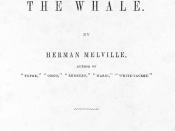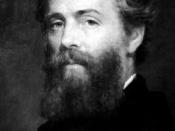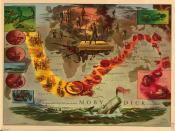"Do human beings have free will or free choice and if not who or what shapes human destiny?" (McSweeney 9) Herman Melville utilizes Father Mapple's sermon in his nineteenth century epic novel Moby Dick, to illustrate the duality of mankind. Mortal man pursues his own singular interests with selfish intent; however, God has prevailing intentions, which are often beyond the comprehension of the individual. Melville expands and elaborates this theme throughout his epic work. The sermon is an omen for the dynamic action of the novel, which is revealed in Captain Ahab's megalomaniacal pursuit of the white whale. No person, ship or force of nature can sway Captain Ahab from his selfish ambition. He is willing to risk his crew, career, and even his life in this pursuit. Melville, in the chapters The Pulpit and The Sermon, provides us with his core tenets and expands and clarifies these values through the events in the work.
Ishmael delineates the entrance and appearance of Father Mapple in detail. Critics believe that Father Mapple was crafted by fusing two New England ministers Melville may have encountered. His character is given certain details, which may lead readers to believe that they have some further purpose. "...Ishmael...is equally committed to the principle that natural facts are the symbols of spiritual facts..."(McSweeney 38) He is described as an old man, known as a former harpooner and is celebrated by all. Father Mapple enters the chapel and closes the doors from the harsh storm outside. The soaking wetness detailed in his coat, shoes and hat may be linked in symbolism of hope and fruition. Ishmael notices Mapple's face is weathered, wrinkled and aged; yet he possesses a new youthful quality. Without intimately knowing him, Mapple's unusual scars attest to an adventurous life spent at sea.


